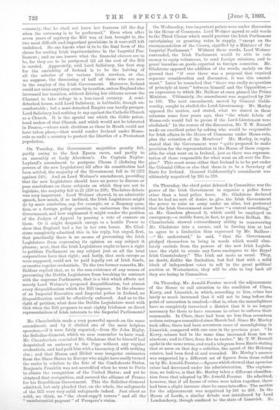On Tuesday, the Government majorities greatly fell, partly owing to
the first Epsom races, and partly to an assembly at Lady Aberdeen's. On Captain Naylor. Leyland's amendment to postpone Clause 3 (defining the powers of the new Legislature) till after its constitution had been settled, the majority of the Government fell to 33 (273 against 240). And on Lord Wohner's amendment, providing that the new Legislature should have no power to discuss or pass resolutions on those subjects on which they are not to legislate, the majority fell to 21 (259 to 238). The latter debate was very important. Lord Wolmer showed, in an admirable speech, how much, if so inclined, the Irish Legislature might do by mere resolution, say, for example, on a Regency ques- tion, or a foreign policy question, to embarrass the central Government, and how unpleasant it might render the position of the Judges of Appeal by passing a vote of censure on them. Or it might despatch envoys to a hostile Power to show that England had a foe in her own house. Mr. Glad- stone completely admitted this in his reply, but urged, first, that practically there is no means of preventing the Irish Legislature from expressing its opinion on any subject it pleases ; next, that the Irish Legislature ought to have a right to petition Parliament on any subject just as all the local corporations have that right ; and lastly, that such envoys as were supposed, could not be paid legally out of Irish funds, or receive regular credentials. To the two former remarks, Mr. Balfour replied that, as to the non-existence of any means of preventing the Dublin Legislature from breaking its contract with the supreme Parliament, that is a blot which affects not merely Lord Wolmer's proposed disqualification, but almost every disqualification which the Bill imposes. In the absence of an Imperial Executive and Imperial police in Ireland, no disqualification could be effectively enforced. And as to the right of petition, what does the Dublin Legislature want with that when the Bill proposes to seat eighty Irishmen as direct representatives of Irish interests to the Imperial Parliament P






































 Previous page
Previous page